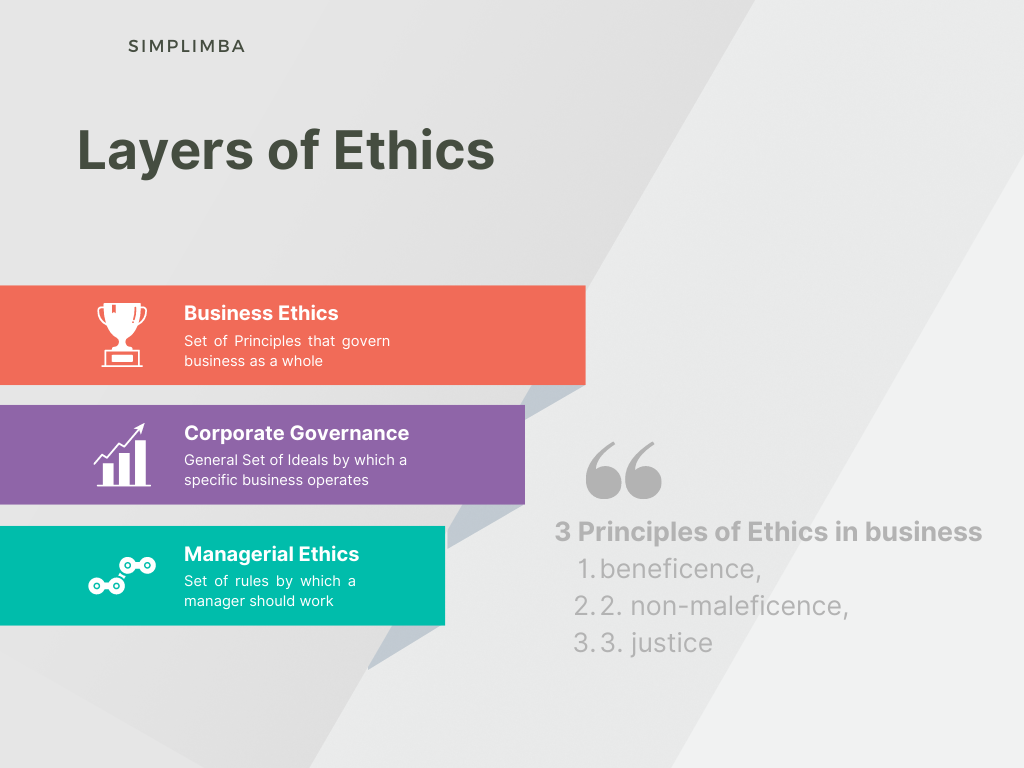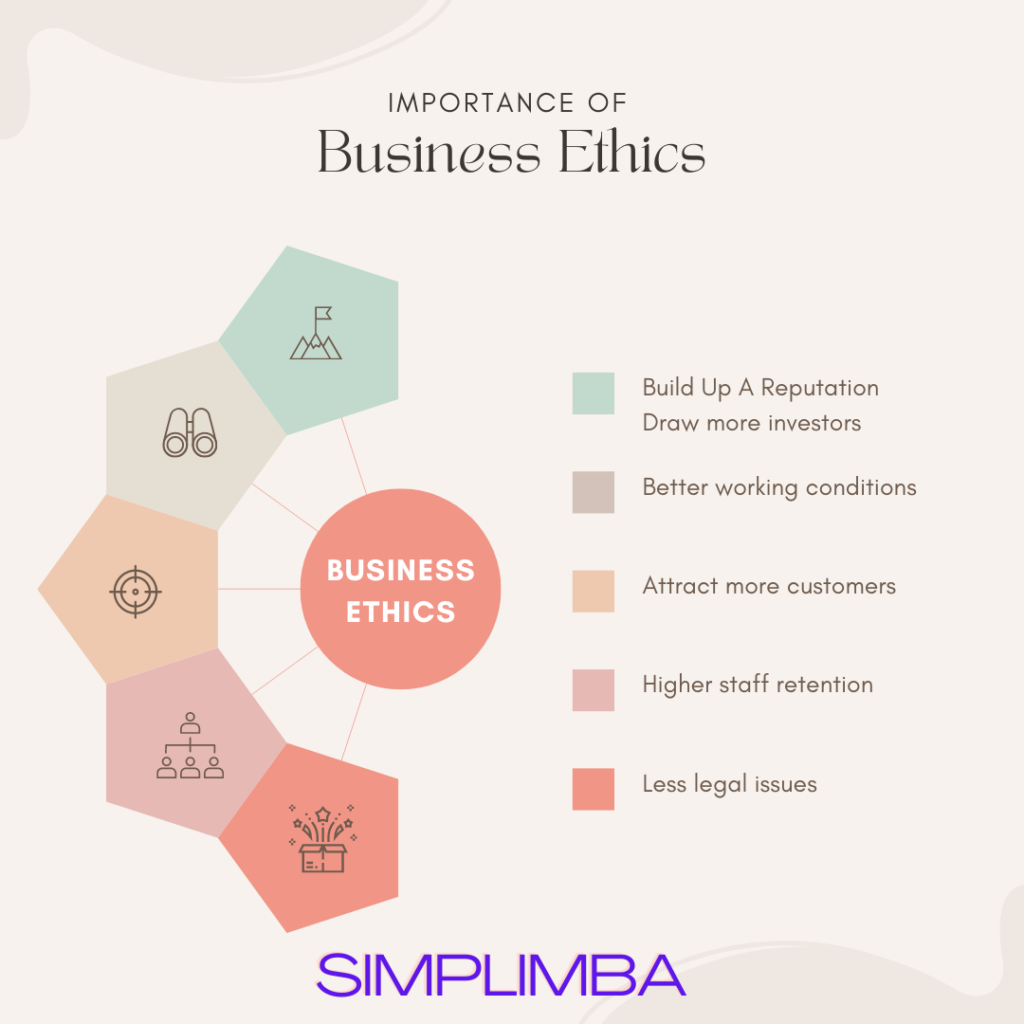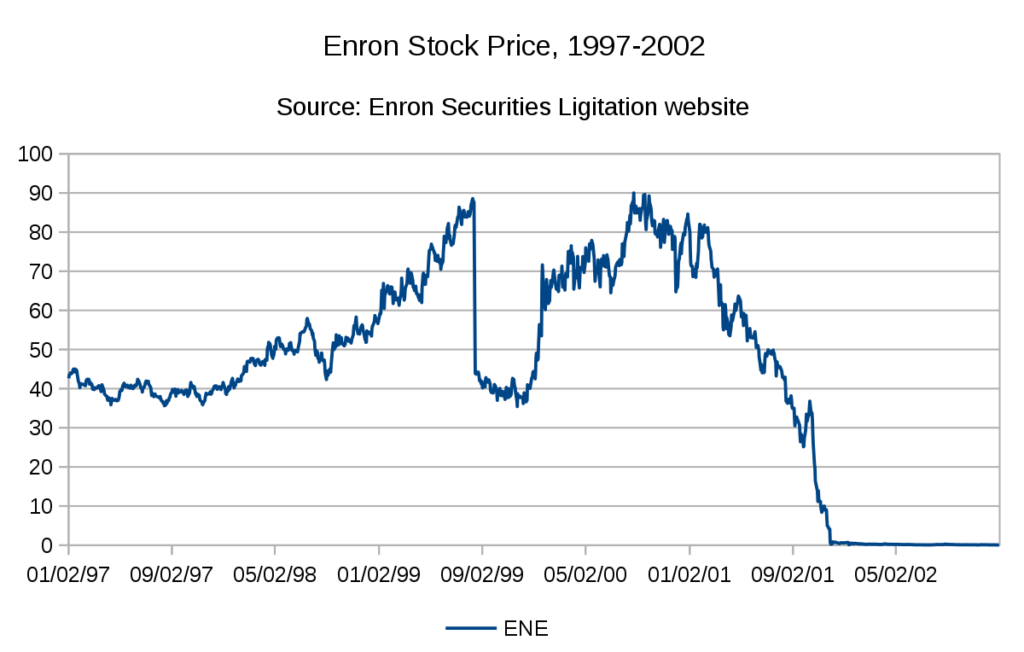
What is Business Ethics?
Business Ethics is a set are set of universally accepted business practices that an organization follows in its strategy and operations. It forms an important part of the strategy of the organization as it has been found that organizations behaving ethically perform better in the long run. The ethics in an organization is often defined by the culture, its employees, and the geographical boundaries it operates.
Corporate ethics and business ethics are often used interchangeably. Business ethics applies to almost entities that are treated as businesses including government, non-profits, and profit-seeking organizations. However, corporate ethics extend mostly to profit-seeking organizations. Having said that underlying principles for both of the concepts are almost the same.
What is Managerial Ethics?
Managerial ethics is a part of business ethics. It is a set of principles and guidelines ordered by the upper management for the managers of a business to help them make better and unbiased decisions. While compiling these ethical principles, everything is considered, including compensation, benefits package, community involvement, corporate giving, and more.
These ethics for business help the employees to differentiate right from wrong in an organization. This doesn’t necessarily mean obeying the laws set by society. Ethical behavior goes much beyond that. A simple difference between ethics and managerial ethics is that ethics are for an individual while managerial ethics are for the entire organization to follow.
What is Corporate Governance?
Corporate governance means controlling, directing, and evaluating the actions of an organization. This structure is typically specified to give the participants of an organization certain rights and responsibilities. Controlling the power among an organization’s participants results in monitoring performance among employees. Corporate governance helps organizational goals be achieved in the desired manner.
Corporate governance captures the economic decisions of a company and has landed in the spotlight because it helps to improve the socioeconomic health of the company and society. However, there are various types of corporate governance such as covering everything from financial transparency to profitability.
These business ethics help the employees to differentiate right from wrong in an organization. This doesn’t necessarily mean obeying the laws set by society. Ethical behavior goes much beyond that. A simple difference between ethics and managerial ethics is that ethics are for an individual while managerial ethics are for the entire organization to follow.

Definitions of Business Ethics
Ethics is the practice of moral judgment. It is the determination of what is right and wrong, good and bad, in relation to one’s own personal beliefs and opinions. It can be applied to both personal and professional life and can determine business success or failure.
There are three main principles that underpin ethics: beneficence, non-maleficence, and justice. Beneficence refers to doing good for others, non-maleficence means not causing harm, and justice means imparting equal treatment to all parties. Each of these principles forms the basis of a number of ethics codes that businesses should adhere to in order to ensure successful business practices.
Businesses must always consider the impact their decisions have on those around them. For example, if business plans to reduce its environmental footprint but doing so may result in job losses, it is necessary to weigh up the impacts of its actions carefully before making any decisions. Similarly, businesses must take into account the feelings and rights of consumers when making decisions that affect their purchasing power or how they are marketed to.
According to Shleifer and Vishny, ‘Corporate governance deals with the ways in
which suppliers of finance to corporations assure themselves of getting a return on their investment.’
An article from Financial Times has defined corporate governance as ‘the relationship of a company to its shareholders or, more broadly, as its relationship to society’.
According to J. Wolfensohn, ‘Corporate governance is about promoting corporate fairness, transparency, and accountability.’
What is the Importance of Business Ethics?

Importance of Business Ethics 1: Build up a reputation
An organization that follows ethical practices in its business can build up a decent reputation in the market for itself. When a company aligns its business with ethics and practices legal activity, it eventually gains a good public image which leads to more referrals. To get the company a reputation, a company needs to provide quality products and efficient services to its customers. This implies a better brand image which results in higher sales.
Importance Of Business Ethics 2: Better working conditions
A healthy and safe environment to work in will definitely help a company become more ethical. One needs to make sure that a strict code of conduct is followed religiously. Some management from the company must be taken into consideration like revising the employment standards from time to time, prohibiting discrimination, encouraging following rules, working ethically, and providing insurance, benefits, etc.
Importance Of Business Ethics 3: Attract more customers
For any business, the most important part is its customers. And to maintain those incoming customers or even gain new ones, a company must focus on the needs of a customer. A company that follows business ethics will ensure that there is a routine discussion on the management and policies, make the products affordable or cost-friendly for all, and provide better quality offerings. This will not only increase an influx of customers but will also gain customer loyalty. Another important thing under business ethics is to treat your customers’ feedback and complaints with utmost seriousness.
Importance Of Business Ethics 4: Higher staff retention
A company with strong principles and morals will naturally have a happy staff. To retain this staff, an organization must try to maintain positive employee interaction, give better pay, fixed working hours, career enhancement, fair treatment, and much more. There must not be any competition among the employees or that may result in a toxic environment for others as well. The company must be honest with its employees and appreciate them for their talent and dedication to their job.
Importance Of Business Ethics 5: Less legal issues
To provide lesser legal problems, a company with strong ethical behavior will hardly have to do anything. Compliance with the law will ultimately result in fewer such issues. To ensure fair practices, keep a check on the activities of your employees, ensure rules and guidelines are followed and encourage people to avoid unfair and illegal practices. A company must never take the quality of material used for granted, must always look after their employee’s health, and care about the environment. This way it will be safe from penalties that could cost the company its reputation and social status.
Importance Of Business Ethics 6: Draw more investors
Investors tend to trust those organizations that have a robust ethical system for their company. They expect fair practices, better returns, and a share in important discussions regarding the business to make sure that their funds are being used wisely. They also expect transparency from the company. When choosing a company to finance, investors, look for the reputation of the company, its history with legal issues, and its employment status. So a business with ethics as its priority is much more likely to be preferred by the investors.
Implications of Business Ethics on its Success
Ethics is the practice of making choices that are in the best interest of others. It is an important part of business, as it is the foundation on which all other actions must stand. Unfortunately, many businesses ignore or neglect their ethical obligations, and this can have far-reaching consequences.
Let us analyze the topic from the lens of 7 Famous Business Ethics Case Studies which bled great organizations not only monetarily but also from the perspectives of shareholder and customer trust
ENRON CASE 2001:
Enron is a well-known corporate scandal, with consequences that the average person can easily identify.
Enron used irregular accounting, which made it impossible for analysts to understand how the company was making money. The SEC investigated and found that Enron hid billions of dollars in liabilities through companies it controlled.
As the Crisis unfolded, Enron’s Share Price Fell from $90.56 to only $1. They had to file for what was then the largest Chapter 11 bankruptcy in history.

Volkswagen Emission Gate 2015:
Volkswagen began its emissions scandal in September of 2015 when the US Environmental Protection Agency accused the company of cheating emissions tests
The results of the Nitrogen emissions released by VW cars were found to be shorting EU law. When the cars were presented to an EPA or emissions testing facility that was not equipped with its own technology for detecting defeat devices, they would turn off the full pollution controls and comply with regulations.
The emissions scandal has led to investigations across the world, with recent estimates suggesting that as many as 11 million cars globally were affected.

British Petroleum Deepwater Horizon 2010:
Following the BP oil spill of 2010, shares in BP collapsed.
The Deepwater Horizon oil rig exploded in the Gulf of Mexico, causing 4.9 million barrels of oil to spill into the ocean. The initial disaster was only fixed months later when BP found a solution that worked.
BP has been forced to pay billions in compensation since the crisis and its effects have been devastating for local ecosystems, wildlife, and locals.
Uber’s “Bro” Culture 2017
In recent years, there have been multiple accusations of sexual harassment and questions over Uber’s “stop-at-nothing” approach to expansion. The latter allegedly saw it using illegal technology to avoid law enforcement while stealing drivers from competitors and spying on users.
Uber, a transportation service provider, was accused of having ‘sexist jokes’ and going to a brothel in Seoul. This scandal led to their CEO’s resignation in June 2017. Though some were not proven, the allegations affected the company’s share price, which was traded privately at the time.
Uber has been investing in its image, including hiring Dara Khosrowshahi as CEO and taking it public. In May 2019, Uber was valued at $69.7 billion and listed at $45 a share.
Apple’s Batterygate 2017
Apple’s biggest scandal in recent years is surely the “Batterygate”.
When an iPhone user in a Reddit thread reported that they were having issues with their device, the post led to a lot of media coverage. Some commenters called out the software update as a deliberate attempt to force upgrades by deliberately slowing down iPhones as they age. Tim Cook later released a statement confirming that the software was designed to improve performance and prevent unexpected shutdowns. In response to negative press, Apple offered a battery replacement gift for those who experienced sluggishness from the initial software updates.
Valeant Pharmaceuticals 2015
Congressional representatives questioned Valeant, the company that raised the price of two drugs, about the scandal. Bernie Sanders and other congressmen asked them to explain why they increased the price of these drugs
One of Valeant’s strategy implementations was acquiring small pharmaceutical companies and raising the prices of their drugs. States were also looming about Valeant controlling a chain of pharmacies called Philidor, which hurt their market. The scandal got deepened in October when it was suspected that Valeant had been abusing this position to inflate the size of its order book and report higher profits.
Equifax Data Breach 2015
Equifax is one of the three credit agencies
In September of 2017, the company announced that it had a major breach. They noticed that this breach could affect many of their US consumers plus many more around the world. This data theft included names, social security numbers, and other personal information that businesses typically need to confirm identities. Many people who are affected by this breach could become victims of identity theft in the future.
These unethical decisions have serious implications for businesses, both short-term and long-term. For example, Volkswagen’s cheating may have caused shortages of cars on the market, which led to higher prices and reduced efficiency (at minimum). Similarly, Sears’ error may have driven customers elsewhere.
Finally, Volkswagen’s flawed systems caused negative repercussions that extend far beyond its own financial interests. All of this puts the company at an unfair disadvantage in the marketplace. The problems discussed above are only an example of the damage that can result from unethical decisions by business leaders. However, these examples highlight why leadership is so vital in constructing ethical cultures within companies.
The Implications can be summarized as follows:
- Fall in share Prices: Whenever a scandal hits the market, the immediate reaction is a steep fall in share prices. In many cases, the senior executives come up with a statement but eventually, it does a lot of damage to the shareholder confidence.
- Shifting of Customers to alternatives: Customers prefer ethical organizations. With such a scandal, they generally gravitate towards alternatives or substitutes
- Loss of Business: For Organizations like Enron, the scandal and the fraud meant the entire loss of business. For other organizations like Volkswagen, they had serious fall in market shares
- Government Fines: Government generally imposes serious fines. These fines may look small for the businesses these companies represent, but they give signals to the market which leads to higher losses. In exceptional cases, the government has imposed fines to the tune of billions of dollars
- Loss of Customer Trust: In modern-day business ethics, everything eventually boils down to customer trust. Ethical issues not only lead to loss of trust of the customer but the entire stakeholders like suppliers, shareholders, and employees. The loss of trust creates a vicious ecosystem where the entire business finds it very difficult to operate
Emotional Implications of Unethical Behavior
Ethical behavior is the best way to guarantee a successful business. The concept of business ethics is in place to make sure that everyone’s rights are respected and that individuals behave in an ethical manner. What does this mean for businesses? First, it means that all business decisions must be made with an understanding of ethics. Second, it insists on high moral standards and ethical behavior from employees, partners, and directors. Finally, it teaches businesses how to conduct themselves ethically when making decisions about their own future.
The purpose of business ethics is to protect people and society as a whole. Ethics play an important role in our daily lives by dictating how we should treat others, what behaviors are acceptable and what actions will result in consequences. Businesses need to adhere to the same principles in order to be successful. Ethical behavior sets the tone for company culture and allows employees to feel appreciated and trusted. Poor ethical practices can damage relationships, reduce productivity and even lead to lawsuits.
Why do organizations have a policy of ethical behavior?
Organizations have necessitated having a policy of ethical behavior due to the following reasons. Business ethics help companies gain the trust of their customers, investors, shareholders, etc, it also helps a company make better decisions that are socially acceptable and includes the major stakeholders to take part and present their opinions as well. Business ethics also enhances employee productivity. If the job doesn’t interfere with their morals, they should be encouraged to work harder and earn more profits and later their work should be appreciated.
Unethical business practices can cause severe consequences like higher risks, fraudulently, etc. so instead work ethically to ensure a safe and successful business. Encourage all staff members to work as a team and not compete against each other as this is against business ethics and can create some chaos within the workspace. Strong ethical morale will help a business create long-term partnership(s) that may help it in the long run. if the company works under a set of rules and principles, it lowers the chances of risks and penalties.
Moreover, an organization that functions on principles will always stay in the good books of the community which will help it earn the loyalty of its stakeholders, increase its sales, and whatnot.
Samrat is a Delhi-based MBA from the Indian Institute of Management. He is a Strategy, AI, and Marketing Enthusiast and passionately writes about core and emerging topics in Management studies. Reach out to his LinkedIn for a discussion or follow his Quora Page
